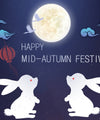Recent Post
Archive
- November 2024
Tags

Qingming Festival: Honoring Ancestors and Welcoming Spring
IrisW
Mar 25, 2025
Qingming Festival, also known as Tomb-Sweeping Day or the Pure Brightness Festival, is a traditional Chinese holiday that dates back thousands of years. It is celebrated on the 15th day after the Spring Equinox—usually falling on April 4th, 5th, or 6th—marking a time of renewal when nature awakens and life begins to flourish again.
Origins and Significance
Originally, Qingming was simply one of the 24 solar terms in the Chinese lunisolar calendar, denoting the time when the weather becomes warmer and the scenery turns fresh and clear. Over time, the festival evolved into a day dedicated to honoring one’s ancestors. Families visit the graves of their loved ones to clean the tombs, remove weeds, and make offerings such as food, fruits, and incense. This act of tomb sweeping is an expression of filial piety—a deep-seated value in Chinese culture that emphasizes respect for the deceased and gratitude for their contributions to the family’s legacy.
Customs and Traditions
During Qingming, various customs bring together the themes of remembrance and the celebration of spring:
Tomb Sweeping: Families gather at ancestral gravesites to clear away debris, repair tombstones, and offer traditional foods and joss paper. The burning of paper replicas—symbolizing money or material goods—is believed to provide the deceased with necessities in the afterlife.
Spring Outings: As the weather warms and nature bursts into life, many people take advantage of the holiday to go on family picnics and stroll through parks or countryside. This practice, often referred to as “treading on green,” reflects the renewal of life and nature.
Kite Flying: An especially popular activity during Qingming is flying kites. In some regions, people even attach small lanterns to the kites at night, creating a beautiful, starry display in the sky. It is believed that letting go of the kite’s string may also help release one’s worries.
Modern Observance
Today, Qingming Festival remains a significant cultural event in China and among Chinese communities around the world. While the essence of ancestral worship is preserved, modern observances have also embraced the spirit of spring by incorporating eco-friendly practices and community outings. In urban areas, government initiatives and community organizations often host events that combine traditional ceremonies with environmental and cultural education.
Conclusion
Qingming Festival is a unique blend of solemn remembrance and the joyful celebration of spring’s arrival. It serves as a reminder of the importance of honoring our roots while also embracing the new life and opportunities that each season brings. Whether through the quiet act of tomb sweeping or the exuberant flight of a kite, the festival connects people to nature, tradition, and the enduring legacy of their ancestors.
← Older Post Newer Post →


